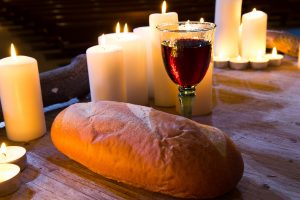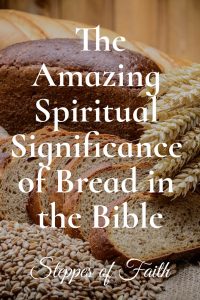
“My Father gives you the true bread from heaven.” (John 6:32)
One unique, fun fact found in the Bible is that it mentions bread at least 492 times. It is so significant that people still include it in their practice of their faith today. Aside from being food, it has other notable, symbolic uses that interconnect and illustrate God’s faithfulness, grace, and life itself.
Exodus 16 quickly comes to mind when we think about bread in the Bible. Here, it symbolizes God’s provision.
After Moses led the Israelites out of Egypt, God rained manna down for forty years while they wandered in the desert. Given the harsh conditions, the people’s survival depended on it.
We still depend on God’s provision for our survival today. Aside from nutritious food, He also provides necessary medicines, finances, shelter, transportation, good friends to lean on, and so much more. He is Jehovah Jireh, “the God Who Provides” for those who put their faith in Him (Gen 22:14).
This lends a very different meaning to “give us this day our daily bread.” When we pray the “Lord’s Prayer” (Mt 6:9-13), it reminds us that God has already promised to provide what we need, day in and day out, without fail. He is always faithful.
Life and Salvation
The Exodus story also describes the Israelites rushing out of Egypt with no time to let their bread dough rise.
“So the people picked up their bread dough before it had risen and carried it on their shoulders in bowls, wrapped up in their clothes.” (Ex 12:34)
The Jewish people still use unleavened bread to celebrate Passover every year. Christians also use bread to celebrate communion, or the Eucharist. However, Christians base the bread’s symbolism on Jesus’ death on the cross and His gift of salvation, not a fast midnight exit.
Recall that Jesus took the unleavened bread and broke it to symbolize His death on the cross on our behalf. We have life (indeed, eternal life) because of His atoning sacrifice. This is why Jesus calls Himself the “bread of life” several times in John 6.
“Jesus told them, ‘I am the bread of life. Whoever comes to Me will never become hungry, and whoever believes in Me will never become thirsty.” (Jn 6:35)
Bread nourishes the body, but Jesus offers spiritual bread that nourishes our spiritual lives. Every time we partake of it, it brings our souls to life, reminding us of the price Jesus paid and of the only way to salvation.

Bread and Forgiveness
Matthew 2 and Luke 2 tell us that Jesus was born in Bethlehem, a word that translates as the “house of bread” in Hebrew. Alphanumerically, Bethlehem also means nativity (“the occasion of a person’s birth”). Therefore, the place of Jesus’ nativity is in the “house of bread,” a place of life.
Recall Jesus saying He is the bread of life, which means forgiveness and freedom from sin. When we go to the “house of bread” to accept God’s forgiveness, we see again how God feeds our souls with something we need to survive spiritually. His bread is the only kind that leads to eternal life.
It further clarifies the Lord’s Prayer. When we ask God to “give us this day our daily bread,” we ask for both His provision and for Him to come and fill us with His everlasting grace.
We need bread to live physically, but God’s bread of forgiveness enables us to live spiritually.
God’s Holy Word
“In the beginning was the Word, and the Word was with God, and the word was God. He was in the beginning with God. All things were made through Him, and without Him nothing was made that was made. In Him was life, and the life was the light of men.” John 1:1-4
Jesus was the physical embodiment of God’s holy word. He and the Word are one and the same. Since Jesus is the bread of life, we can make the connection that the Bible feeds us spiritually.
“Man shall not live by bread alone, but man lives by every word that proceeds from the mouth of the Lord.” Deuteronomy 8:3; Matthew 4:4
For the Bible to nourish us, though, we must open it up and read it. God gives us free will to choose whether to read it. But if we genuinely want to experience the depth of His grace and find eternal life, we must “eat” His bread, i.e., read the Word. That is where the meat and nutrients are that daily keep us spiritually alive.
The Marriage Feast
Bread also signifies a future end time and the establishment of the millennial kingdom. After God raptures all true believers in Christ (1 Thess 4:16-17; 1 Cor 15:51-52) during the Tribulation period, He will reunite them (the church) with Jesus at the marriage feast of the Lamb (Jesus).
“Let us be glad, rejoice, and give Him glory because the marriage of the Lamb has come, and His bride has prepared herself. Then He said to me, ‘Write: Blessed are those who are called to the marriage supper of the Lamb!’” (Rev 19:7, 9)
Isaiah 25:6 also describes the future marriage feast.
“And in this mountain the Lord of hosts will make for all people a feast of choice pieces, a feast of wines on the lees, of fat things full of marrow, of well-refined wines on the lees.”
Here again, we see Jesus as the spiritual bread and the eternal life we find through Him alone.
“Blessed is he who shall eat bread in the kingdom of God!” (Lk 14:15)

God’s Eternal Presence
In Moses’ time, God directed the high priests to build a table made of acacia wood and place it on the north side of the Holy Place of the temple (Ex 25:30; Lev 24:5-9). God then commanded them to place twelve loaves of bread called showbread on the table to represent the twelve tribes of Israel.
The priests did not offer the showbread to God like the food offered to pagan gods; instead, the loaves were a form of thanksgiving for God’s constant care and presence.
Bread was also a peace offering (Lev 7:12) and an offering of first fruits or tithe (Num 15:17-20). These offerings were called “the bread of His Presence” (in Hebrew, “the bread of His face”), so named because they were made not only to God but also in His presence.
In the New Testament, priests used the showbread as a memorial symbol for Jesus and His sacrifice on the cross, based on the Last Supper in Matthew 26:26.
“Most assuredly, I say to you, Moses did not give you the bread from heaven, but My Father gives you the true bread from heaven. For the bread of God is He who comes down from heaven and gives life to the world.” John 6:32-33
Since that time, we have continued to use bread in our communion ceremonies to remember Jesus’ work of salvation and redemption, and to praise Him for His constant presence and faithfulness.
Other Symbols of Bread
Bread is also found in many other places in the Bible.
- Unity of the church (1 Cor 10:16-17)
- An enemy we can defeat (Num 14:9)
- A sign of meeting people’s needs (Ecc 11:1)
- The acceptance of wisdom (Prov 9:5)
- Making an unearned living (Prov 31:27)
- Wealth (2 Kg 18:32)
- Poverty (Amos 4:6)
- Prophecy of Jesus’ betrayal by Judas Iscariot (Ps 41:9; Jn 13:18)
Bread can symbolize many things in the Bible, but it points most clearly to Jesus Himself. He is the bread we must all consume if we truly want to experience physical and spiritual freedom, the depth of His love, and eternal life.

When I think about bread as it is used in the Bible I think about Christ body and how it was to be broken and eaten in remembrance of him. I also think about multiplying and feeding the multitudes.